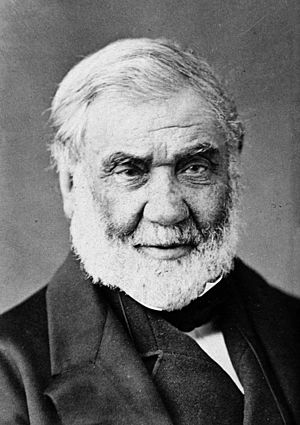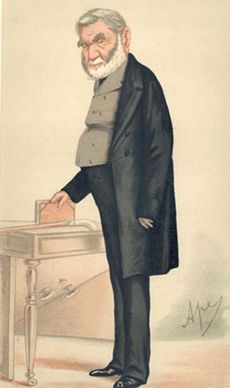Anthony Panizzi facts for kids
Quick facts for kids
Anthony Panizzi
|
|
|---|---|
 |
|
| Born |
Antonio Genesio Maria Panizzi
16 September 1797 Brescello, Cisalpine Republic
|
| Died | 8 April 1879 (aged 81) |
| Nationality | Naturalised British of Italian descent |
| Alma mater | University of Parma |
| Awards | Knight Commander of the Order of the Bath |
| Scientific career | |
| Fields | Library science |
| Institutions | British Museum Library |
Sir Antonio Genesio Maria Panizzi (born September 16, 1797 – died April 8, 1879) was an important librarian. He was born in Italy but later became a British citizen. He was also an Italian patriot, meaning he loved his home country and worked for its freedom. From 1856 to 1866, he was the head librarian (called the Principal Librarian) of the famous British Museum in London.
Contents
Early Life in Italy
Panizzi was born in a town called Brescello in Italy on September 16, 1797. He went to school in Reggio and then studied law at the University of Parma. He finished his degree in 1818. After that, he worked as an Inspector of Public Schools in Brescello.
During this time, Italy was facing political problems. Panizzi was accused of being a Carbonari. This was a secret group that was against the government in power. It seems the accusation was true.
In October 1822, Panizzi learned he was going to be arrested. Many Carbonari members were being arrested and put on trial. He quickly left Italy and went to Ticino, a part of Switzerland. In 1823, he wrote a book there. This book spoke out against the unfair trials happening in Italy. Because of his book, he was found guilty without being present in court. He was even sentenced to death in Italy. The Italian government also tried to get him removed from Switzerland.
Moving to England and Library Career
In May 1823, Panizzi moved to England. He became a British citizen in 1832. When he first arrived in London, he received help from an Italian poet named Ugo Foscolo. Panizzi moved to Liverpool and taught Italian to make a living.
In 1826, he met a lawyer named Henry Brougham. Panizzi helped Brougham with a difficult legal case. When Brougham became a very important judge (the Lord Chancellor of England), he helped Panizzi get a job. First, Panizzi became a professor of Italian at the new London University. Later, he got a job at the British Museum Library.
Panizzi held several important jobs at the British Museum:
- Assistant Librarian (1831–1837)
- Keeper of Printed Books (1837–1856)
- Principal Librarian (1856–1866)
Because of his amazing work as a librarian, Queen Victoria made him a knight in 1869. He received the title Knight Commander of the Order of the Bath.
The British Museum library was like the national library for the United Kingdom. While Panizzi was in charge of printed books, the library grew a lot. It went from 235,000 books to 540,000 books. This made it the biggest library in the world at that time!
Panizzi also helped design and build the famous circular British Museum Reading Room. This large, round room was designed by architect Sydney Smirke based on Panizzi's own ideas. The new reading room opened in 1857. The British Museum library later became a big part of the British Library in 1973. The "Round" Reading Room was used until 1997.
Panizzi faced some challenges during his time at the library. Some people criticized his appointment as Keeper of Printed Books. They thought an Englishman should be in charge, not someone of Italian origin.
He also had a long disagreement with historian Thomas Carlyle. Carlyle complained that Panizzi wasn't helpful when he was researching. Later, when Carlyle wanted a private room at the library for his work, Panizzi said no. Even with complaints from important people, Carlyle lost the argument. He and his friends then started their own library, the London Library.
While working at the library, Panizzi created a new way to organize books. He developed "Ninety-One Cataloguing Rules" in 1841 with his team. These rules became the foundation for how libraries organized their books for many years. They even influenced modern digital ways of cataloging.
Panizzi also made sure the Copyright Act of 1842 was followed. This law required all British publishers to send a copy of every book they printed to the library.
Panizzi strongly believed that everyone should have free and equal access to learning. He once said:
I want a poor student to have the same means of indulging his learned curiosity, of following his rational pursuits, of consulting the same authorities, of fathoming the most intricate inquiry as the richest man in the kingdom, as far as books go, and I contend that the Government is bound to give him the most liberal and unlimited assistance in this respect.
This means he wanted everyone, rich or poor, to have access to the same books and information.
Panizzi is also known for inventing the "Panizzi pin." This is a special pin that helps support wooden shelves and stops them from wobbling.
Political Work and Awards
Panizzi was friends with important British leaders like Prime Ministers Lord Palmerston and William Ewart Gladstone. He also wrote many letters to Italian Prime Minister Count Camillo Benso di Cavour. Through a French friend, he also knew French Emperor Napoléon III and Empress Eugénie.
In 1844, Panizzi helped Giuseppe Mazzini, another Italian exile in London. He wrote an important article that criticized the government for opening Mazzini's private letters. Panizzi also helped arrange a visit for the Italian hero Giuseppe Garibaldi to England. He convinced Gladstone to visit Naples to see the terrible conditions of political prisoners there.
When efforts to free these prisoners failed, Panizzi raised money to buy a ship. He planned an expedition to rescue the prisoners from an island prison. Sadly, the ship sank in a storm. In 1859, the prisoners were released by the King of Naples and sent on a ship to New York. Panizzi then organized a new plan. His son took control of the ship and brought the former prisoners to England. There, they found safety and support.
Besides his British knighthood, Panizzi received many other honors:
- An honorary degree from Oxford University.
- The Légion d'Honneur from France.
- Various awards from the Italian Government.
- He was appointed as a senator in the Italian Parliament in 1868, but he never took his seat.
Panizzi passed away in London on April 8, 1879. He was buried in the Kensal Green Catholic Cemetery.
Panizzi also worked on and published special editions of two famous Italian poems: Matteo Maria Boiardo's Orlando Innamorato and Ludovico Ariosto's Orlando Furioso.
The Panizzi Lectures are a series of talks about books and libraries held every year at the British Library since 1985. There is also a meeting room at the British Library named the Panizzi Room in his honor.
See Also
 In Spanish: Anthony Panizzi para niños
In Spanish: Anthony Panizzi para niños
 | Bessie Coleman |
 | Spann Watson |
 | Jill E. Brown |
 | Sherman W. White |


